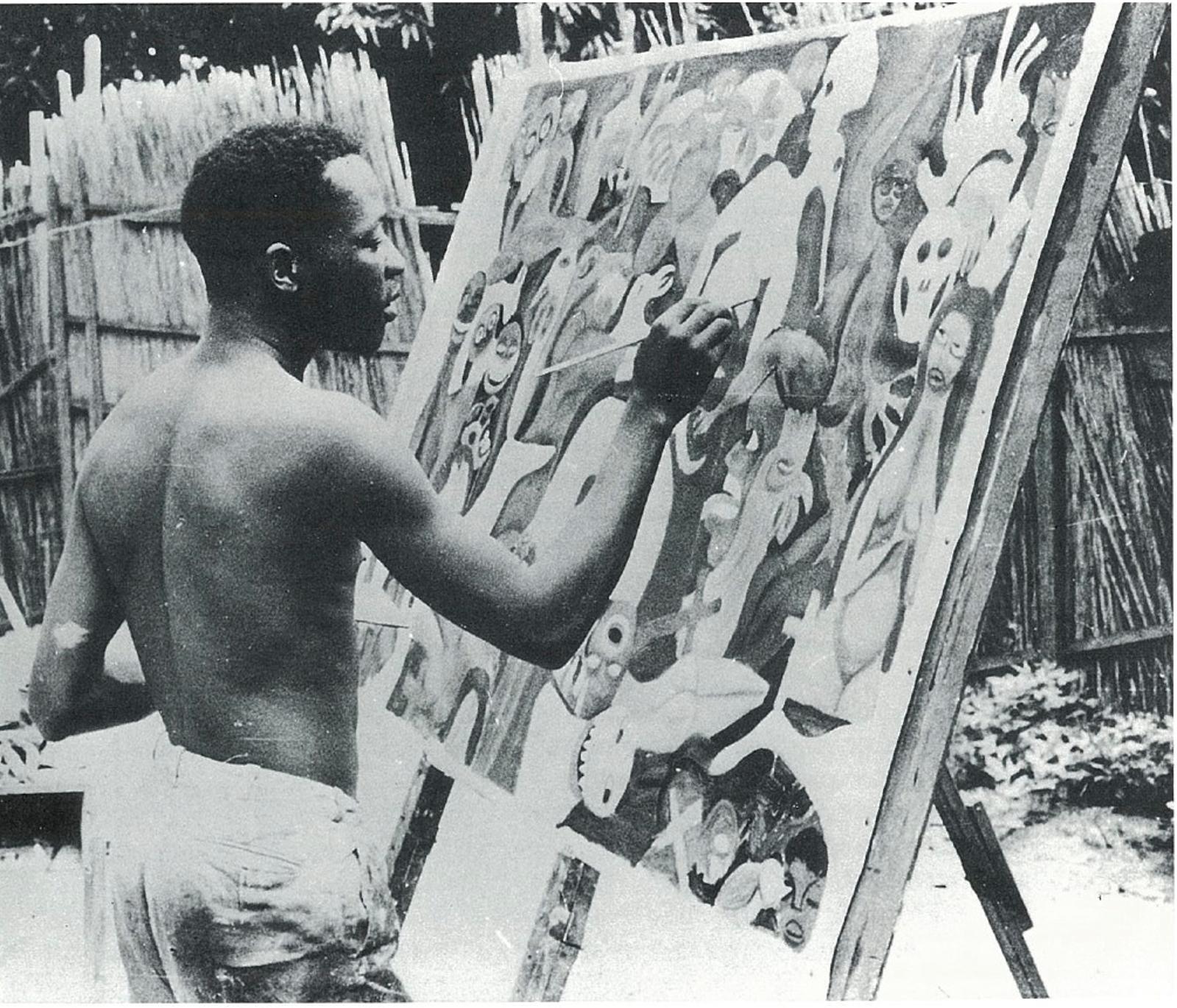At the invitation of the national Institut d’histoire de l’art, Riason Naidoo, an independent curator and researcher, offered a meeting dedicated to the pioneers of contemporary African art. Designed as a conversation with many voices, the symposium will focus on African artists of the 1960s and 1970s but also on the collectives and festivals that marked the dynamics of art in this decade and will bring together witnesses, artists, curators, critics, art historians and historians. specializing in this period.
From the 1960s – after a generation or two of African artists influenced by modernist traditions before them – many artists began to interpret the specifics of local contexts and their personal journeys in dealing with the international art scene, such as Alexander Boghossian (Ethiopia) and Ibrahim El-Salahi ( Sudan). Later, the self-taught Malangatana Ngwenya, from Mozambique, and Chéri Samba, from the Democratic Republic of the Congo, formed a non-conformist artistic vision. Nigeria’s Uche Okeke is one of the iconic artists and theorists of this pioneering generation, along with his compatriot Twins Seven Seven. Vincent Kofi from Ghana, Joe Ouakam and Iba N’Diaye from Senegal, Sydney Kumalo, Gladys Mgudlandlu, Helen Sebidi and Dumile Feni from South Africa, Thomas Mukarobgwa and Joseph Ndandarika from Zimbabwe are just a few of the other great icons of this generation to whom speakers will return.
This plurality of perspectives and experiences will make it possible to trace single trajectories and collective movements at a time when, with the end of the Cold War and the evolution of world politics, contemporary African art began to be the subject of increasing international attention.
This symposium is fully translated into English and French
/
At the invitation of the National Institute of Art History, Riason Naidoo, curator and independent researcher, offered a meeting dedicated to the pioneers of African contemporary art. Designed as a conversation with many voices, the symposium will focus on the African artists of the 1960s and 1970s, the collectives and festivals that marked the dynamics of art in this decade and will bring together witnesses, artists, curators, critics, art historians and historians specializing in yourself at this time.
From the 1960s – after a generation or two of African artists influenced by modernist traditions before them – many artists, such as Alexander Boghossian (Ethiopia) and Ibrahim El-Salahi (Sudan), began to interpret the specifics of their local and personal contexts. journey in the face of the international art scene. Others, such as self-taught artists such as Malangatana Ngwenya, from Mozambique, and Chéri Samba, from the Democratic Republic of the Congo, form non-conformist artistic visions. Nigeria’s Uche Okeke is one of the iconic artists and theorists of this pioneering generation, along with his compatriot Twins Seven Seven. Vincent Kofi from Ghana, Joe Ouakam and Iba N’Diaye from Senegal, Sydney Kumalo, Gladys Mgudlandlu, Helen Sebidi, Dumile Feni, David Koloane from South Africa, Thomas Mukarobgwa and Joseph Ndandarika from Zimbabwe, are just a few of the other great icons of this generation. where the speaker will reflect.
This plurality of perspectives and experiences will make it possible to trace single trajectories and collective movements at a time when, with the end of the Cold War and the evolution of world politics, contemporary African art began to be the subject of increasing international attention.
The conference is fully translated into English and French
Head of Programming / Program Curator
Riason Naidoo (curator and independent researcher), visiting researcher at INHA in 2020
Intervention / Speaker
Oluwabunmi Ayobami Amao (Center for Black and African Arts and Civilizations (CBAAC), Lagos), Barrymore Anthony Bogues (Brown University, Providence), Raphael Chikukwa (National Gallery of Zimbabwe, Harare), Prince Dube (Hector Pieterson Museum, Soweto), Sarah Frioux -Salgas (musée du quai Branly – Jacques Chirac, Paris), Elizabeth Giorgis (The Africa Institute, Sharjah), Thembinkosi Goniwe (University of Rhodes, Grahamstown), Salah Hassan (The Africa Institute, Sharjah; Cornell University, Ithaca) , Pallo Jordan (former Minister of Culture, South Africa), Chuu Krydz Ikwuemesi (artist and critic; University of Nigeria, Nsukka), Portia Malatjie (University of Cape Town), Riason Naidoo (curator, Paris/Cape Town), Malick Ndiaye (Cheikh-Anta- Diop University – Théodore-Monod Museum of African Art, Dakar), Simon Njami (writer and curator, Paris), Sylvester Ogbechie (University of California, Santa Barbara), Mario Pissarra (Africa South Art Initiative, Durban), Calvin Reid ( photojournalist and editor ita, New York), Nadine Siegert (Goethe-Institut, Lagos), Paraska Tolan Szkilnik (University of Suffolk, Ipswich), Mongane Wally Serote (poet, Johannesburg).
About / About Riason Naidoo
Born in Durban (South Africa), Riason Naidoo is a visiting researcher at INHA in 2020. He is director of the National Gallery of South Africa (2009-2015); director of the South Africa-Mali Project on the Timbuktu manuscript; artistic project manager at the French Institute in South Africa; teacher at the University of the Witwatersrand; head of art education at the Durban Art Gallery. He has created many projects, including the public art project Any Given Sunday (2016) in Cape Town, artist Peter Clarke’s retrospective exhibitions in Paris, London and Dakar (2012-2013), exhibition 1910-2010: From Pierneef to Gugulective, at the National Gallery. South Africa, which offers a new look at the century of South African art, or The Indian in DRUM magazine in the 1950s, dedicated to the memory of the Indian community in South Africa (on tour from 2006 to 2011). This latter project resulted in a book published in 2008 and a documentary Legends of the Casbah (2016). Naidoo has curated exhibitions of work by South African photographer Ranjith Kally in Johannesburg, Durban, Bamako, Barcelona, Vienna, Reunion and Cape Town (2004-2011). As of 2012, Naidoo is one of the curators of the 10th edition of the biennial Dak’art in Senegal. In 2021 Naidoo is the curator of neuf 3, a public art project with contemporary African artists set in the city of Saint-Denis.
Download the program

“Reader. Future teen idol. Falls down a lot. Amateur communicator. Incurable student.”


![Bogusław Wołoszański: “Achieving nuclear weapons would be the beginning of World War III” [WYWIAD]](https://storage.googleapis.com/bieszczady/rzeszow24/articles/image/877236c0-66fd-457a-9eb4-41792f9077ff)




